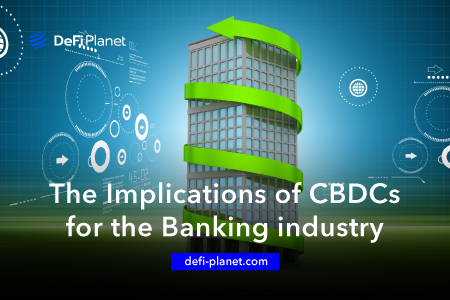Last updated on November 17th, 2022 at 12:55 pm
A Central Bank Digital Currency (CBDC) is the digital version of a fiat currency that is created by the government with the aim of enabling a digital version of cash and improving digital transactions in an economy. As a digital currency issued by the central bank of a country, it is a tool that has similar functionalities to a traditional fiat currency. It can be used as a monetary policy tool to affect economic activities within a region. This virtual government-issued currency may also be a mechanism to bank the unbanked in a given society, depending on how it is implemented. Some countries are creating their CBDCs as a way of “replacing” cryptocurrencies.
What Role might Commercial Banks play in CBDC?
CBDCs are issued by the central bank of a country, which is the apex financial institution that acts as the government’s banker and typically oversees the regulatory supervision of commercial banks. They design the monetary and financial stability policies of a country. For decades, central banks have cooperated with commercial banks to ensure the monetary stability of the economy. Macroeconomic management is a crucial aspect of the apex institution’s role, while the offering of banking services to the citizenry is the domain of the commercial banking institutions. Usually, citizens of a region have little or no direct interactions with central banks, as they have to use the commercial banks as intermediaries. The apex financial institution uses the banks under it to interact with the citizens.
In the era of CBDC that is being ushered in, using the Nigerian e-naira as an example, commercial banks are used in deploying this virtual government-issued currency. The Central Bank of Nigeria launched, monitors, regulates the e-Naira, while the country’s commercial banks deploy them to the citizens. A resident can access the CBDC on their banking app or download the e-Naira wallet from mobile app stores.
It may not be incredibly different from the deployment and client management strategies used by commercial banks to offer services as regards the traditional fiat currency. If a customer encounters an issue, they can seek solace from their bank.
Apart from the aforementioned, CBDCs may create avenues for commercial banks to develop additional products that benefit both their operations and the experience of their clientele. If the model used by the Nigerian government is to be considered, commercial banks may not have to compete with the CBDC implementation system, as they can complement themselves.
That said, a retail CBDC model can lead to the commercial banks being removed from their role as intermediaries i.e. disintermediated. The Central Bank can create an infrastructure to interact directly with clients, eliminating the role of a middleman.
With the coming of CBDCs, stakeholders such as commercial banks have the “opportunity” to introduce new digital business models if they are to survive long term.
The Risks of Banking Sector Disintermediation
Disintermediation is a process of eliminating the need for a financial intermediary before a transaction is completed. When this occurs, the middlemen are removed from the value chain, allowing the producer to interact directly with the end-user. In the case of a commercial transaction, disintermediation means that the producer or wholesaler boycotts the retailer and sells directly to the end-user. For this process to work effectively, there should be an existing infrastructure designed to ease the communication between concerned parties.
CBDCs may therefore have significant effects on the role of commercial banks as intermediaries between central banks and the customers. When a Central Bank wants to disburse financial benefits to the citizens, it tends to use commercial banks. During tax return season, residents of a country are expected to pay their taxes via commercial banks, and not the apex institution. In situations where the central bank wants to reduce monetary supply, it uses the mechanisms of the banks under its control to effect the necessary changes. There is hardly any direct interaction with a central bank and residents, except for a support team that allows clients to complain to the apex authority when a commercial bank was negligent in its duties. Usually, this open means of communication is one of the only ways that the central bank interacts with end-users.
CBDCs promote the disintermediation of financial transactions in a country. In the case of a retail CBDC system, the Central bank interacts directly with the citizens through an encrypted wallet. Once the wallet is downloaded, a client can purchase the CBDC directly from the apex authority, and enjoy whatever benefits that accrue to it. In the tax season, the central bank can deduct taxes, levies and fines directly from the wallet without the need to use the commercial bank. If the government has a benefits plan for some residents, the wallet is used to dispense the funds. This system reduces inefficiency that is linked to intermediaries, costs, and duplicated infrastructure.
Disintermediation will only be aftermath of CBDCs if the government opts for a retail version, instead of the wholesale CBDC, where the regular interbank infrastructure can be used.
Will CBDCs Lead to Bank Crises?
Central Bank Digital Currencies are an innovative solution that is being integrated into the financial architecture of different countries. Depending on the type of CBDC that is implemented, the effects on commercial banks may vary. For wholesale CBDCs, the banks interact with one another, which is similar to what is obtainable in the traditional fiat system. The Central Bank issues the CBDC to the commercial banks, while the latter deploys it to the end-users. In this scenario, there will be hardly any changes to the operations of banks.
On the other hand, a retail CBDC cuts out the role of commercial banks as intermediaries, allowing the apex authority to interact directly with residents of a region. In this case, there are risks attached to banks.
Many traditional bank accounts have charges attached to them that are deducted monthly and make up a source of revenue for the banks. A similar revenue stream may be implemented in the CBDC wallet if it is managed by commercial banks. These banks can also create innovative products surrounding the Central bank’s digital currency that will benefit them and their clients. Once a retail CBDC system is implemented, the aforementioned may not exist for banks.
With the aim of banking the unbanked, a retail CBDC structure is designed to be seamless and efficient, meaning that more users may opt for it instead of the traditional bank payment infrastructure. This could affect the banking system negatively, especially in the revenue streams generated from its regular payment structure.
A further and more pronounced impact could take the form of migration of bank deposits (retail, SME, corporates) from commercial banks to central banks. That is, bank customers may opt to keep their money with central banks as they are safer. After all, for bank customers, the fiat money that is deposited in their bank accounts is, in reality, “commercial bank money”. The value of commercial bank money and the trust it holds stems from its one-to-one convertibility to central bank money (such as cash) by said commercial banks. However, when commercial banks become insolvent, their customers stand to lose all of their deposited money or at least the portions that exceed any amounts guaranteed by a particular country’s Deposit Guarantee Scheme.
However, a CBDC would be a direct claim on the central bank that issued it (just like paper money is), which in effect makes it “risk-free”. The central bank can always honour the customer’s claim since it can simply issue some new CBDCs to pay its liabilities. Therefore, from the perspective of a bank customer, this makes CBDCs a safer type of money than one issued by a commercial bank.
It is possible that such a pronounced migration does not take place because, for example, commercial banks manage to offer better customer service and/or interest than central banks. However, even in such a situation, a sudden migration to CBDCs would remain a big risk in the event of bank stress or crisis. That is, the stability perceived to exist in CBDCs might also be the very reason commercial banks are not stable.
Since central banks are responsible for ensuring the stability of the financial sector, they would have an incentive to find ways to counteract the “liquidity” risks explained above, such as disincentivizing placing deposits with the central bank. Central banks typically regulate t commercial banks and since central banks would also be responsible for CBDCs, they have the power to strike a balance, such that CBDCs does not replace commercial banks. Apex authorities use commercial banks to implement their economic policies, meaning that the survival of these banks is crucial to them.
The Implications of CBDCs or Monetary Policy
Traditionally, a central bank utilizes the commercial banks under its control to influence economic policies and changes. Interest rate is one of the tools used by apex authorities to control the economy. With the resultant disintermediation effect, Central Banks can control interest rates without them being restricted by zero-lower bound (ZLB). They have the authority to decide on the interest attached to a CBDC, and lending institutions will be unable to lend below that interest rate.
A monetary policy rate is a tool used by the authorities to control the direction of other rates. MPR is one of the tools used in both contractionary and expansionary monetary policies. In a contractionary policy, the authorities want to reduce the money supply in the economy and increase the cost of borrowing. To do this, they can increase the MPR, which increases interest rates. This can also be utilized in the case of CBDCs.
Apex authorities may inject money into the economy in deflation through a retail CBDC system by offering benefits like grants and loans to citizens.
In Conclusion,
- A CBDC can be used by the government and public authorities to facilitate the transition to a digital economy.
- In a deflationary economy, CBDCs may be used by the government to inject money into the economy.
- Banks may face serious risks depending on the type of CBDC issued by the monetary authorities.
- CBDCs can increase the rate of disintermediation of commercial banks, especially if there is a flight to safety in the case of a retail CBDC.
If you would like to read more articles like this, visit our Website. You can also follow DeFi Planet on Twitter, Facebook, Instagram, and LinkedIn.





















